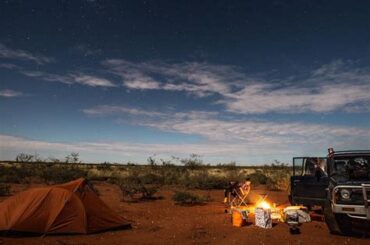Choosing the Right Camping Gear
When going camping, it is essential to choose the right camping gear to ensure a comfortable and enjoyable experience outdoors. The right gear can make a huge difference in how well you sleep, how easy it is to cook meals, and how well you can protect yourself from the elements. Whether you are an experienced camper or a beginner, it is important to have the right equipment to meet your specific needs. In this blog post, we will explore some tips and guidelines to help you choose the right camping gear.
1. Do your research: Before purchasing any camping gear, it is important to do your research. Look for online reviews, check out camping forums, and talk to experienced campers to get recommendations on the best gear brands and models.
2. Consider the weather: The weather conditions of your camping destination will play a crucial role in determining the type of gear you need. If you are camping in cold, wet conditions, you will need a waterproof tent, warm sleeping bags, and proper insulation. On the other hand, if you are camping in hot and dry conditions, you will need lightweight, breathable gear.
3. Assess your needs: Take some time to consider your specific needs and preferences. How many people will be camping with you? Do you prefer a larger tent for more space or a compact one for easy transportation? Are you planning to cook elaborate meals or simple ones? These questions will help you determine the size and functionality of the gear you need.
4. Quality matters: While cost is certainly an important factor, it is crucial not to compromise on the quality of your camping gear. Investing in high-quality gear will ensure its durability and reliability, giving you peace of mind during your camping trips.
5. Try it before you buy it: Whenever possible, try out the gear before making a purchase. Visit a local camping store or rent gear from a reputable outdoor retailer to test it out. This will help you understand if the gear meets your expectations and preferences.
Choosing the right camping gear is crucial for a successful camping trip. By doing thorough research, considering the weather, assessing your needs, prioritizing quality, and testing out the gear, you can ensure a comfortable and enjoyable camping experience. So, get ready to pack your bags and embark on your next adventure with confidence!
Setting Up Your Campsite: Dos and Don’ts
Setting up your campsite properly is essential for a successful and enjoyable outdoor experience. Whether you are a seasoned camper or a beginner, following the dos and don’ts of campsite setup will ensure that you have a comfortable and safe stay in the wilderness.
DO: Choose a suitable location for your campsite. Look for a flat, dry area away from potential hazards such as dead trees or rocky terrain. Consider the proximity to water sources and bathroom facilities if available. Also, check if camping is allowed in the area and if any permits are required.
DON’T: Set up your campsite near water bodies or in low-lying areas prone to flooding. This can lead to discomfort, damage to your equipment, and potential safety risks. Similarly, avoid setting up camp under dead or overhanging trees that could pose a danger in case of strong winds or storms.
DO: Clear the ground before pitching your tent. Remove any rocks, twigs, or debris that could make your sleep uncomfortable. You can also place a tarp or groundsheet underneath your tent for added protection against moisture and to prolong the lifespan of your tent.
DON’T: Dig trenches around your tent to divert water flow during rain. This can cause erosion and harm the natural landscape. Instead, choose a proper location that is not prone to water accumulation and ensure your tent is properly sealed and waterproofed to protect against rain.
| DO | DON’T |
|---|---|
| Secure your tent properly using stakes or guylines to prevent it from being blown away by strong winds. | Leave your tent unattended or unzipped, exposing yourself and your belongings to insects, wildlife, and unwanted weather conditions. |
| Store your food securely in bear-resistant containers or hang it from a tree branch away from your sleeping area. | Leave food, garbage, or scented items unattended that might attract animals to your campsite, creating potential risks. |
| Keep a campfire (if allowed) contained in a designated fire pit and always have a bucket of water or sand nearby to extinguish it. | Build a fire anywhere outside the designated areas or neglect to properly extinguish the fire before leaving your campsite. |
DO: Respect the natural environment and leave no trace behind. Pack out all your trash, including food scraps and toilet paper. Follow proper waste disposal guidelines and use designated bathroom facilities if available. Be mindful of the noise you create and avoid disturbing wildlife or other campers.
DON’T: Litter or vandalize the surroundings, trees, or rocks. Avoid using soap or detergents directly in natural water sources to protect aquatic life. Respect any specific rules or regulations in place for the area you are camping in, such as fire restrictions or wildlife protection measures.
By following these dos and don’ts when setting up your campsite, you will not only create a comfortable and safe space for yourself but also contribute to the preservation of the natural environment for future campers to enjoy.
Essential Camping Skills Every Beginner Should Learn
When it comes to camping, having the right skills can make all the difference. Whether you are a seasoned camper or just starting out, there are certain essential camping skills that every beginner should learn. These skills not only ensure your safety and well-being during your outdoor adventures but also enhance your overall camping experience. In this blog post, we will explore some of these essential camping skills and how they can benefit you as a beginner.
1. Setting Up a Tent: One of the most important skills every camper should master is setting up a tent. Your tent serves as your temporary shelter and protects you from the elements. Make sure you practice setting up your tent before heading out on your camping trip. Familiarize yourself with the different components of the tent, such as poles, stakes, and rainfly. Pay attention to the proper placement of the tent, ensuring it is on level ground and away from potential hazards.
2. Starting a Campfire: Building a campfire is not only essential for cooking meals but also for creating a cozy ambiance during your camping trip. Make sure you learn the proper techniques of starting a campfire safely. Gather dry firewood, kindling, and tinder to ensure a successful fire. Remember to check if there are any fire restrictions in the area you plan to camp and always practice fire safety.
3. Navigation Skills: Having basic navigation skills is crucial for any camper. It’s important to know how to read a map and use a compass to find your way around. Additionally, familiarize yourself with the trails in the area you plan to camp and learn how to navigate using landmarks. These skills will not only help prevent you from getting lost but also allow you to explore the wilderness confidently.
- 4. Packing Essentials: Knowing what to pack is key to a successful camping trip. Make a checklist of essential camping gear, such as a sleeping bag, cooking utensils, food, and personal items. Don’t forget to pack a first aid kit and emergency supplies. Remember to pack light and only bring what you truly need.
- 5. Leave No Trace: As a responsible camper, it’s important to practice Leave No Trace principles. These principles include packing out your trash, minimizing campsite impact, and respecting wildlife and nature. By following these principles, you can help preserve the beauty of the outdoors for future generations.
| Skill | Description |
|---|---|
| Setting Up a Tent | Master the art of setting up a tent, ensuring proper placement and stability. |
| Starting a Campfire | Learn how to safely start and maintain a campfire, taking precautions and abiding by fire restrictions. |
| Navigation Skills | Acquire basic navigation skills, such as reading maps, using a compass, and identifying landmarks. |
| Packing Essentials | Create a checklist of essential camping gear and pack light to ensure a smooth camping experience. |
| Leave No Trace | Practice Leave No Trace principles to minimize your environmental impact and respect nature. |
By mastering these essential camping skills, you will be well-prepared to embark on your outdoor adventures. Remember, camping is all about immersing yourself in nature, disconnecting from the hustle and bustle of daily life, and enjoying the simple pleasures of the great outdoors. So go ahead, embrace the wilderness, and make unforgettable memories on your next camping trip!
Staying Safe in the Wilderness: Important Tips
Staying safe in the wilderness should always be a top priority when embarking on a camping trip. While it can be an exhilarating and rewarding experience, it is crucial to be prepared and aware of potential dangers. By following a few important tips, you can ensure that your camping adventure remains safe and enjoyable.
Firstly, it is essential to research and familiarize yourself with the area you will be camping in. Look for any potential hazards such as wildlife, unstable terrain, or extreme weather conditions. Knowing what to expect will help you pack the necessary gear and make informed decisions during your trip.
Secondly, always let someone know about your camping plans. Provide them with your itinerary, including your expected arrival and departure dates. If anything were to go wrong, this information could be crucial in locating and rescuing you. Additionally, consider investing in a reliable communication device, such as a satellite phone or a personal locator beacon, for emergencies.
Next, it is important to pack essential safety gear. This should include a first aid kit, extra food and water, a map and compass, a flashlight, a whistle, and a fire starter. These items will help you handle common accidents, navigate your way, signal for help, and provide basic necessities if you become stranded. Being well-prepared can greatly minimize the risks associated with camping in the wilderness.
Furthermore, familiarize yourself with basic survival skills. Learn how to start a fire safely, construct a shelter, and identify edible plants in the area. These skills can be invaluable in emergency situations and will greatly increase your chances of survival. Consider taking a wilderness survival course or doing research online to learn these essential skills before your trip.
In addition, always practice Leave No Trace principles. These guidelines help preserve the natural environment and minimize the impact of human activities. Respect wildlife and their habitats, dispose of waste properly, and leave the area as you found it. By doing so, you can help protect the wilderness for future generations to enjoy.
In conclusion, staying safe in the wilderness is of utmost importance when camping. By researching the area, informing others of your plans, packing essential safety gear, learning survival skills, and practicing Leave No Trace principles, you can minimize risks and ensure a safe and enjoyable camping experience. Remember, preparation and precautions are key to staying safe while enjoying the wonders of the great outdoors.
Enjoying the Outdoors: Making the Most of Your Camping Experience
When it comes to camping, there’s nothing quite like immersing yourself in the great outdoors. Whether you’re a seasoned camper or just starting out, making the most of your camping experience is essential. From exploring new trails to cozying up around a campfire, there are countless ways to enjoy the outdoors on your camping trip.
One of the key elements to truly enjoying the outdoors and maximizing your camping experience is choosing the right camping gear. From a sturdy tent to comfortable sleeping bags, having the right equipment can make all the difference. Make sure to do your research and invest in high-quality gear that suits your needs.
Next, setting up your campsite correctly is crucial. This includes finding a level spot away from potential hazards such as uneven ground or low-hanging branches. Additionally, it’s important to follow the dos and don’ts of camping etiquette. This means respecting the environment, minimizing your impact, and keeping noise levels to a minimum.
Aside from gear and campsite setup, it’s also important to learn essential camping skills. Knowing how to start a fire, navigate with a compass, and identify edible plants can enhance your camping experience and ensure your safety in the wilderness. Consider taking a basic camping skills course or doing some research beforehand to be well-prepared.
Staying safe in the wilderness is another crucial aspect of enjoying the outdoors on your camping trip. Always be aware of your surroundings, pack a first aid kit, and inform someone about your itinerary before heading out. Understand the wildlife in the area and know how to react if you encounter any potentially dangerous animals.
Finally, making the most of your camping experience means truly embracing all that nature has to offer. Take the time to disconnect from technology and fully immerse yourself in the beauty of the wilderness. Go for a hike, try fishing, or simply sit back and enjoy the peacefulness of your surroundings. By appreciating the small moments and the natural wonders around you, you’ll create lasting memories and truly make the most of your camping experience.
Summary:
- Choose the right camping gear for a comfortable and enjoyable experience.
- Set up your campsite correctly, following camping etiquette.
- Learn essential camping skills to enhance your experience and ensure safety.
- Stay safe in the wilderness by being aware of your surroundings and prepared for emergencies.
- Embrace nature and disconnect from technology to fully enjoy the outdoors.
Tips for Making the Most of Your Camping Experience:
| Tip | Description |
|---|---|
| 1. Research and invest in quality gear | Having the right equipment will greatly improve your camping experience. |
| 2. Find a suitable campsite | Choose a spot that provides safety, comfort, and beautiful surroundings. |
| 3. Learn basic camping skills | Knowing essential skills such as fire-starting and navigation will enhance your experience. |
| 4. Be prepared for emergencies | Pack a first aid kit and inform someone about your plans to stay safe in the wilderness. |
| 5. Disconnect and embrace nature | Take the opportunity to truly appreciate the beauty and tranquility of the outdoors. |
Frequently Asked Questions
Example Question: Why is it important to choose the right camping gear?
Choosing the right camping gear is important because it can greatly affect your comfort and safety during your camping trip. Well-constructed and appropriate gear will help protect you from the elements, ensure a good night’s sleep, and make your overall camping experience more enjoyable.
Question: What are some dos and don’ts when setting up your campsite?
Do: Choose a level and well-drained area for your tent, set up a safe campfire zone, and practice leave-no-trace principles. Don’t: Set up your campsite near cliffs or dead trees, leave food out overnight, or neglect to properly extinguish your campfire before leaving.
Question: What are some essential camping skills that every beginner should learn?
Some essential camping skills for beginners include: setting up a tent, building a campfire, cooking over an open flame or a camp stove, navigating with a map and compass, and basic first aid skills. It’s also important to learn how to properly pack and store food to prevent wildlife encounters.
Question: What are some important tips for staying safe in the wilderness while camping?
Some important tips for staying safe in the wilderness while camping include: informing someone of your camping plans, packing necessary safety equipment such as a first aid kit and a whistle, being aware of your surroundings and potential hazards, practicing proper food storage to avoid attracting wildlife, and being prepared for changing weather conditions.
Question: How can you make the most of your camping experience and enjoy the outdoors?
To make the most of your camping experience and enjoy the outdoors, try to disconnect from technology, take time to appreciate nature, engage in outdoor activities like hiking or fishing, learn about the local wildlife and plants, and make an effort to relax and unwind in the peaceful environment.
Question: What are some tips for making your camping experience more comfortable?
To make your camping experience more comfortable, invest in high-quality and appropriate camping gear, pack extra layers of clothing for varying temperatures, bring comfortable bedding and pillows, use portable camping chairs and tables for convenience, and consider bringing camping essentials such as bug repellent and sunscreen.
Question: How can you enhance the safety of your campsite during nighttime?
You can enhance the safety of your campsite during nighttime by setting up adequate lighting, such as headlamps or lanterns, to prevent tripping hazards and make it easier to navigate. It’s also important to properly store food to avoid attracting nocturnal animals and to ensure all campfire embers are completely extinguished before going to bed.





